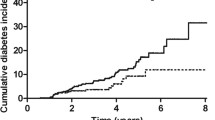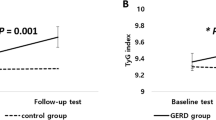Abstract
Background
Obesity is recently known as a risk factor for endoscopic gastritis. Adiponectin is an anti-inflammatory cytokine secreted from fat tissue, and its serum concentrations are reduced in obesity. The relation between adiponectin and gastritis remains unclear.
Aims
The aim of this study was to determine whether lower serum adiponectin level is associated with the risk of endoscopic gastritis.
Methods
We analyzed medical records of participants of a routine health check-up examination. Association among endoscopic findings, serum adiponectin level, and other clinical factors including age, sex, alcohol habit, smoking habit, body mass index (BMI), blood pressure, cholesterol, triglyceride, glucose, and insulin were investigated. Endoscopic erosive gastritis was defined as a flat or minimally depressed white spot surrounded by a reddish area or small elevation with central umbilications mimicking octopus’ suckers.
Results
A total of 2,400 participants were enrolled. BMI was significantly higher in gastritis-positive participants than in gastritis-negative participants. Serum adiponectin levels were significantly lower in gastritis-positive participants than in gastritis-negative participants. Multivariate logistic regression analysis revealed that lower serum adiponectin level (OR 0.96; 95% CI 0.93–0.99), smoking (OR 0.50; 95% CI 0.30–0.80), higher blood pressure (OR 1.02; 95% CI 1.01–1.03), and duodenitis (OR 1.8; 95% CI 1.00–3.09) were significantly associated with endoscopic erosive gastritis.
Conclusions
Lower serum level of adiponectin may increase the risk of endoscopic erosive gastritis, independently of BMI. Our findings facilitate further study to clarify the role of hypoadiponectinemia in erosive gastritis.


Similar content being viewed by others
References
Wisse BE, Kim F, Schwartz MW. Physiology. An integrative view of obesity. Science. 2007;318:928–929.
Gerson LB. Impact of obesity on endoscopy. Gastrointest Endosc. 2009;70:758–762.
Dutta SK, Arora M, Kireet A, et al. Upper gastrointestinal symptoms and associated disorders in morbidly obese patients: a prospective study. Dig Dis Sci. 2009;54:1243–1246.
Renshaw AA, Rabaza JR, Gonzalez AM, et al. Helicobacter pylori infection in patients undergoing gastric bypass surgery for morbid obesity. Obes Surg. 2001;11:281–283.
Kim HJ, Yoo TW, Park DI, et al. Influence of overweight and obesity on upper endoscopic findings. J Gastroenterol Hepatol. 2007;22:477–481.
Garrow D, Delegge MH. Risk factors for gastrointestinal ulcer disease in the US population. Dig Dis Sci. 2010;55:66–72.
Matsuzawa Y, Nakamura T, Shimomura I, et al. Visceral fat accumulation and cardiovascular disease. Obes Res. 1995;3:645S–647S.
Maeda K, Okubo K, Shimomura I, et al. cDNA cloning and expression of a novel adipose specific collagen-like factor, apM1 (AdiPose Most abundant Gene transcript 1). Biochem Biophys Res Commun. 1996;221:286–289.
Matsuzawa Y. Adiponectin: a key player in obesity related disorders. Curr Pharm Des. 2010;16:1896–1901.
Ouchi N, Walsh K. Adiponectin as an anti-inflammatory factor. Clin Chim Acta. 2007;380:24–30.
Kamada Y, Tamura S, Kiso S, et al. Enhanced carbon tetrachloride-induced liver fibrosis in mice lacking adiponectin. Gastroenterology. 2003;125:1796–1807.
Nishihara T, Matsuda M, Araki H, et al. Effect of adiponectin on murine colitis induced by dextran sulfate sodium. Gastroenterology. 2006;131:853–861.
Araki H, Nishihara T, Matsuda M, et al. Adiponectin plays a protective role in caerulein-induced acute pancreatitis in mice fed a high-fat diet. Gut. 2008;57:1431–1440.
Yamada T, Araki H, Watabe K, et al. Adiponectin deficiency enhanced the severity of cerulein-induced chronic pancreatitis in mice. J Gastroenterol. 2010;45:742–749.
Ogiyama H, Kamada Y, Kiso S, et al. Lack of adiponectin promotes formation of cholesterol gallstones in mice. Biochem Biophys Res Commun. 2010;399:352–358.
Examination Committee of Criteria for ‘Obesity Disease’ in Japan. Japan Society for the Study of Obesity. New criteria for ‘obesity disease’ in Japan. Circ J. 2002;66:987–992.
Lundell LR, Dent J, Bennett JR, et al. Endoscopic assessment of oesophagitis: clinical and functional correlates and further validation of the Los Angeles classification. Gut. 1999;45:172–180.
SAS Institute Inc. 2005 SAS users group international 30. Available at: http://www2.sas.com/proceedings/sugi30/155-30.pdf. Accessed February 11, 2010.
Verdich C, Madsen JL, Toubro S, et al. Effect of obesity and major weight reduction on gastric emptying. Int J Obes Relat Metab Disord. 2000;24:899–905.
Orlando RC. Overview of the mechanisms of gastroesophageal reflux. Am J Med. 2001;111:174S–177S.
Barak N, Ehrenpreis ED, Harrison JR, et al. Gastro-oesophageal reflux disease in obesity: pathophysiological and therapeutic considerations. Obes Rev. 2002;3:9–15.
Kamal N, Chami T, Andersen A, et al. Delayed gastrointestinal transit times in anorexia nervosa and bulimia nervosa. Gastroenterology. 1991;101:1320–1324.
Robinson PH, Clarke M, Barrett J. Determinants of delayed gastric emptying in anorexia nervosa and bulimia nervosa. Gut. 1988;29:458–464.
Klok MD, Jakobsdottir S, Drent ML. The role of leptin and ghrelin in the regulation of food intake and body weight in humans: a review. Obes Rev. 2007;8:21–34.
Lewin MJ, Bado A. Gastric leptin. Microsc Res Tech. 2001;53:372–376.
Shibata R, Sato K, Pimentel DR, et al. Adiponectin protects against myocardial ischemia-reperfusion injury through AMPK- and COX-2-dependent mechanisms. Nat Med. 2005;11:1096–1103.
Wilson DE. Role of prostaglandins in gastroduodenal mucosal protection. J Clin Gastroenterol. 1991;13:S65–S71.
Laine L, Takeuchi K, Tarnawski A. Gastric mucosal defense and cytoprotection: bench to bedside. Gastroenterology. 2008;135:41–60.
Shankar RR, Vikram K, Ananthakrishnan N, et al. Erosive gastroduodenitis and Helicobacter pylori infection. Med Sci Monit. 2003;9:CR222–224.
Armstrong D. Review article: gastric pH—the most relevant predictor of benefit in reflux disease? Aliment Pharmacol Ther. 2004;20:19–26.
Johnson DA, Katz PO, Levine D, et al. Prevention of relapse of healed reflux esophagitis is related to the duration of intragastric pH > 4. J Clin Gastroenterol. 2010;44:475–478.
Tatsuta M, Iishi H, Okuda S. Relationship of erosive gastritis to the acid secreting area and intestinal metaplasia, and the healing effect of pirenzepine. Gut. 1987;28:561–565.
Kawamoto R, Tabara Y, Kohara K, et al. Smoking status is associated with serum high molecular adiponectin levels in community-dwelling Japanese men. J Atheroscler Thromb. 2010;17:423–430.
Nakamura M, Haruma K, Kamada T, et al. Cigarette smoking promotes atrophic gastritis in Helicobacter pylori-positive subjects. Dig Dis Sci. 2002;47:675–681.
Veldhuyzen van Zanten SJ, Sherman PM. Helicobacter pylori infection as a cause of gastritis, duodenal ulcer, gastric cancer and nonulcer dyspepsia: a systematic overview. CMAJ. 1994;150:177–185.
Watabe H, Mitsushima T, Derakhshan MH, et al. Study of association between atrophic gastritis and body mass index: a cross-sectional study in 10,197 Japanese subjects. Dig Dis Sci. 2009;54:988–995.
Torisu T, Matsumoto T, Takata Y, et al. Atrophic gastritis, but not antibody to Helicobacter pylori, is associated with body mass index in a Japanese population. J Gastroenterol. 2008;43:762–766.
Acknowledgments
The authors thank Shoji Ishitani at Sumitomo Hospital for the assiduous effort in data collection from the annual health checkup records.
Conflict of interest
The authors declare no conflict of interest and no grant support or other financial arrangement with any of the commercial entities mentioned in this report.
Author information
Authors and Affiliations
Corresponding author
Rights and permissions
About this article
Cite this article
Yamamoto, S., Watabe, K., Tsutsui, S. et al. Lower Serum Level of Adiponectin Is Associated with Increased Risk of Endoscopic Erosive Gastritis. Dig Dis Sci 56, 2354–2360 (2011). https://doi.org/10.1007/s10620-011-1681-3
Received:
Accepted:
Published:
Issue Date:
DOI: https://doi.org/10.1007/s10620-011-1681-3




